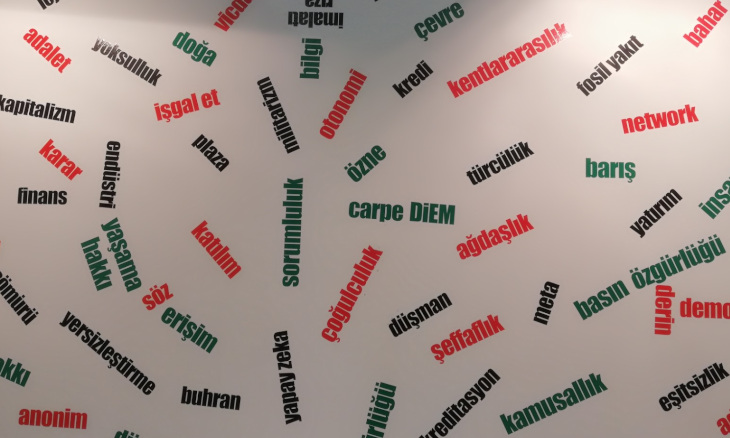Pan-Europeanism comes to Turkey
Former Prime Minister Ahmet Davutoğlu made a formal comeback on Dec. 13 with the new party he founded, the “Future Party.” Former Finance Minister Ali Babacan’s new party is counting down the days to its launch and is due to take off either by the end of December or in the early days of January. There is also a surprise movement making its debut in Turkey: the pan-European movement DiEM25-Democracy in Europe Movement 2025.
Just as 2019 is ending, the political scene in Turkey is starting to welcome some newcomers. Former Prime Minister Ahmet Davutoğlu made a formal comeback on Dec. 13 with the new party he founded, the “Future Party.” Former Finance Minister Ali Babacan’s new party is counting down the days to its launch and is due to take off either by the end of December or in the early days of January. However, there is also a surprise movement making its debut in Turkey: the pan-European movement DiEM25-Democracy in Europe Movement 2025.
Diem25 was founded by the economics professor and former finance minister of Greece Yanis Varoufakis and Croatian philosopher Srećko Horvat. The official launch ceremony took place on February 9, 2016 at the Volksbühne Theatre in Berlin, where Varoufakis announced that “Europe will be democratized, or it will disintegrate, and it will do so quite fast,” and that DiEM25 would “shake Europe — gently, compassionately, but firmly.” The launch also saw speeches delivered by Barcelona’s mayor, Ada Colau, and philosopher Slavoj Žižek, as well as the virtual attendance of (now jailed) WikiLeaks founder Julian Assange. The theatrical setting was not coincidental: as Miguel Urbán Crespo, European Parliamentarian for Spain’s Podemos party said, “When parliaments become theatres, we have to turn theatres into parliaments.”
DiEM25 describes itself as “a pan-European, cross-border movement of democrats.” And it reiterates the following:
“We believe that the European Union is disintegrating. Europeans are losing their faith in the possibility of European solutions to European problems. At the same time as faith in the EU is waning, we see a rise of misanthropy, xenophobia and toxic nationalism.
If this development is not stopped, we fear a return to the 1930s. That is why we have come together despite our diverse political traditions — Green, radical left, liberal — in order to repair the EU. The EU needs to become a realm of shared prosperity, peace and solidarity for all Europeans. We must act quickly, before the EU disintegrates.”
Just as support for the European Union is decreasing (hanging around 44 percent as of November 2019) and nativist rhetoric increasingly dominates the national political agenda in Turkey, DiEM25 is also taking root here. The movement’s local branch will be established in January, and it will be the third country to participate outside the borders of the EU, joining the U.S. and Serbia.
In fact, the “DiEMers” of Turkey have been active since the beginning of 2019. They number around 100 people now. Almost all are “ordinary folks,” unrelated to any other political movements. They were inspired by the idea of DiEM25 and started becoming engaged in its activities. As DiEM25 was created as a “transnational movement,” a lot of its activity is online; it is easy to become an active member of the movement without having to travel and be physically present in its activities.
The DiEMers of Turkey connected with the larger movement without knowing each other and met for the first time last February. After that, in May, they started conducting regular meetings. Some of these meetings were face-to-face and others were online. As a side note, as members do not want to be restrained by established technological firms and existing internet frameworks and programs, the movement created its own software and technological tools.
In November 2019, Turkey’s DiEMers presented a piece of art they created at the ARTIST fair of Istanbul: a constellation of concepts and words written in black, green and red. The ones in black belonged to the “populist domain” and ones in red were those DiEM25 embraced. The ones in green highlighted the climate crisis.

By now, there are three DiEM25 networks in Turkey that conduct regular meetings — one in Izmir and two in Istanbul. These networks have just concluded their first formal meetings at the beginning of December. And from December 15 to 16, they had a visitor: DiEM25’s founder Yanis Varoufakis, who visited participants at the Istanbul meeting. He also gave two conference talks, one at Boğaziçi University and the other at Kadir Has University. Varoufakis also participated at a closed roundtable that included experts, journalists and academics. There was not much debate about DiEM25’s future activities in Turkey at these events: rather, Varoufakis presented the philosophy of the movement and debated the sociopolitical context that led to the foundation of the movement.
Since its establishment, DiEM25 has organized across the European Union and by now they have around 125,000 members. The movement participated in the May 2019 European elections: they just barely missed the single seat they were about to gain. While DiEM25 is pan-European, the EU Parliament elections do take place within national frameworks, so MeRA25, the European Realistic Disobedience Front was founded in 2018 as a political party in Greece and a part of DiEM25. While MeRA25 did not win seats in the EU Parliament, they got 3.44 percent of the vote in the national Greek elections, which resulted in a gain of nine seats.
DiEM25 has a system that is more like a civil society organization than a political party: it has four constituent parts that are connected to one other through a checks and balances mechanism. All policies and candidates are approved by all members, so now the members from Turkey will have a say in determining MeRA25 candidates running in Greece’s elections and all other DiEM25 candidates — for example, those competing in the EU Parliament elections.
Right before participating in DiEM25’s events that featured Varoufakis, I was in Greece, where there was a lot of talk about an impending war with Turkey. While Turkey’s public is not very aware of a possible Greek-Turkish war on the horizon, there was unease among those of us participating in the roundtable of DiEM25. As the winds of war blow across the Aegean and Mediterranean, it was refreshing to be inspired by transnational ideals. Today may be bleak, but tomorrow might be recreated from scratch based such ideals.

